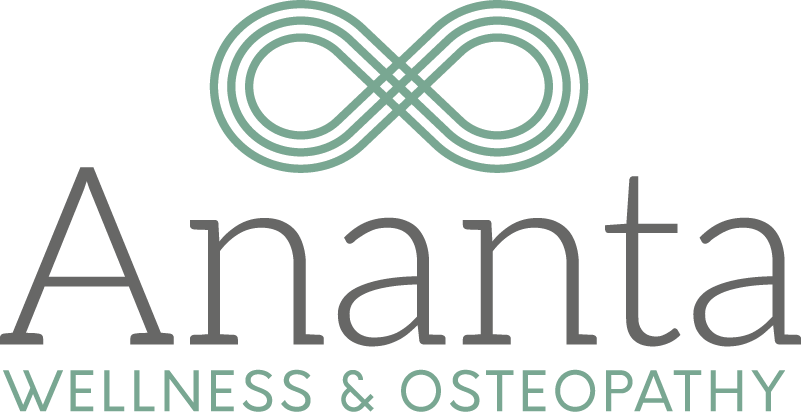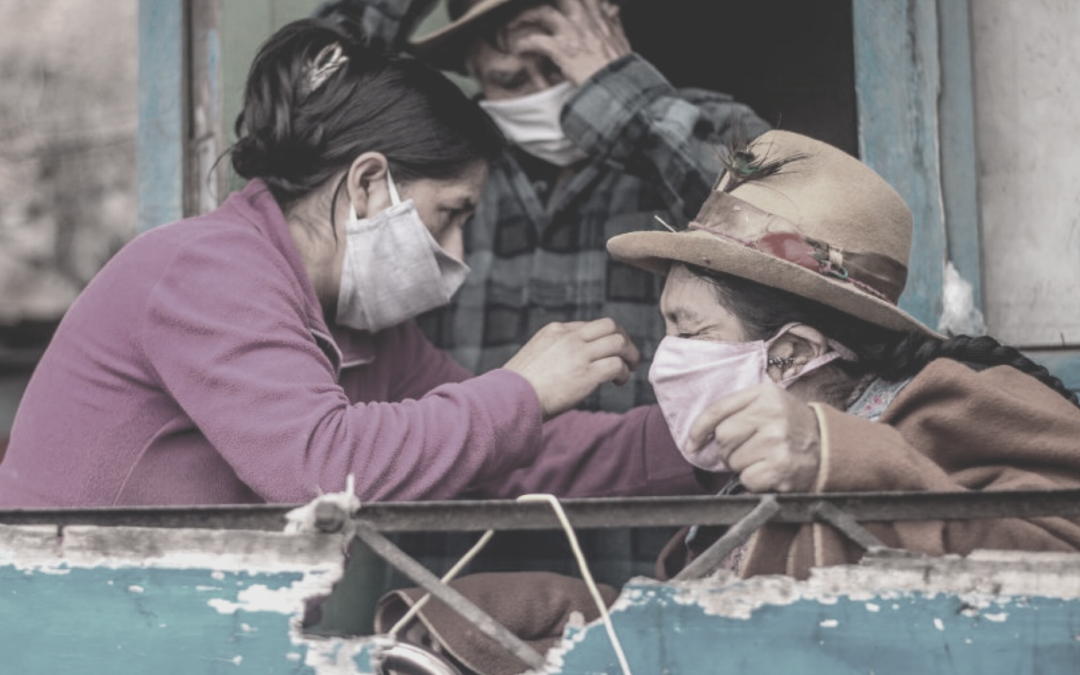As many of you know Peru has become very close to my heart, and in many ways it’s like a second home to me. Over the last handful of years, I’ve had the opportunity to participate in an Osteopathy Without Borders mission in Arequipa, Peru. I have met the most incredible and beautiful souls, made friends for life and memories that will always be with me. Not a day goes by that I don’t think of the people I’ve met and the struggles this bright and loving community is facing in this current global crisis.
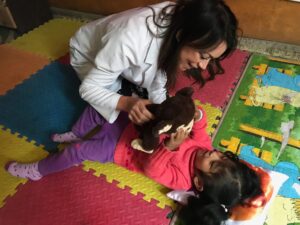 I was in Arequipa when the first cases of Covid-19 in Peru were detected in mid-March. A group of 11 Osteopathic Practitioners sat around a table over our morning tea and breakfast discussing the realities of a global pandemic breakout in Peru. The fear and concern amongst the local Peruvians was palpable, not to mention the rising unease each of us shared with the logistics of being away from home and serving a community in such need during an unprecedented crisis.
I was in Arequipa when the first cases of Covid-19 in Peru were detected in mid-March. A group of 11 Osteopathic Practitioners sat around a table over our morning tea and breakfast discussing the realities of a global pandemic breakout in Peru. The fear and concern amongst the local Peruvians was palpable, not to mention the rising unease each of us shared with the logistics of being away from home and serving a community in such need during an unprecedented crisis.
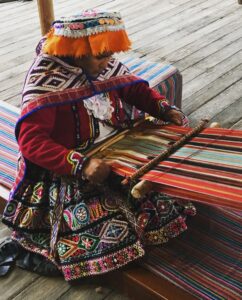
Arequipa, like most cities in Central and South America, have a number social-economical limitations, as well as, daily cultural practices that make it very difficult to cope with an infectious global pandemic. Arequipa is a bustling city in the southern part of Peru, surrounded by volcanoes, with diverse scenic and cultural spaces, local farmers and gifted artisans. Arequipa is the second most populated city in Peru and is an important industrial and commercial centre for the country.
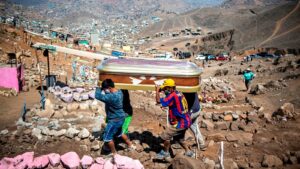
Peru imposed one of the earliest and strictest lockdown in Latin America in an attempt to stop the spread of Coronovirus – but still case number rose rapidly and death rates have been incredibly high. Peru has reported more cases than most counties, despite testing numbers for the virus being relatively low. Between March 16th and May 31st, the number of deaths in Peru was 87% higher than what would be expected in a typical year. (Photo: Ernesto Benavides/Agence France-Presse — Getty Images)
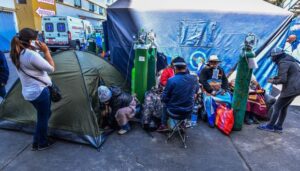 In recent weeks Arequipa has become the new Covid-19 epicenter in Peru, with over 20,000 reported cases and 928 deaths. The situation is compounded with shortages of medicine, beds, doctors and protective equipment. The crowed, compromised and under-equipped healthcare system is on the verge of collapse. Experts say Peru’s Healthcare system was underprepared, leading to more deaths and a rapid spread of the infectious virus. (Photo: Diego Ramos/GEC)
In recent weeks Arequipa has become the new Covid-19 epicenter in Peru, with over 20,000 reported cases and 928 deaths. The situation is compounded with shortages of medicine, beds, doctors and protective equipment. The crowed, compromised and under-equipped healthcare system is on the verge of collapse. Experts say Peru’s Healthcare system was underprepared, leading to more deaths and a rapid spread of the infectious virus. (Photo: Diego Ramos/GEC)
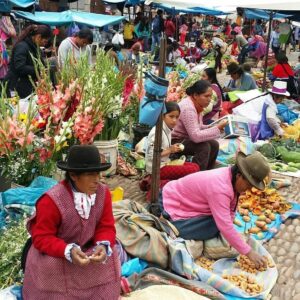 A number of social and economic factors can also explain the countries struggle. More than 40% of households in Peru do not have a refrigerator and many don’t have the logistics to allow them to stock up on food. One of my most favourite things to do in Arequipa is going to the local market. In the early hours of the morning local famers travel into the city centre to sell their grains, meats, fruits and vegetables. Since locals have to go out frequently to buy food and supplies – markets have become a main source of contagion. About 70% of the employed population in Peru work in the “informal” employment sector, one of the highest rates in all of Latin America.
A number of social and economic factors can also explain the countries struggle. More than 40% of households in Peru do not have a refrigerator and many don’t have the logistics to allow them to stock up on food. One of my most favourite things to do in Arequipa is going to the local market. In the early hours of the morning local famers travel into the city centre to sell their grains, meats, fruits and vegetables. Since locals have to go out frequently to buy food and supplies – markets have become a main source of contagion. About 70% of the employed population in Peru work in the “informal” employment sector, one of the highest rates in all of Latin America.
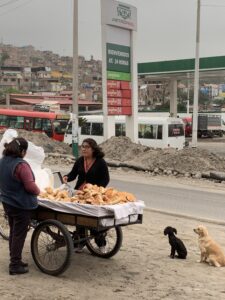
Jobs are unpredictable, making social distancing very difficult, with crowded public transportation used to get to and from work or markets to sell goods. This informal sector has limited, if any, access to basic services of health, education, nutrition, pensions or to financial safety nets and typically work for cash, with no sick leave or job security.
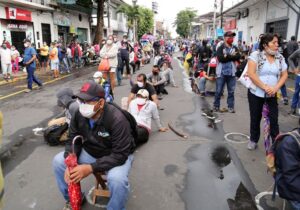 In addition, only 38% of Peruvian adults have a bank account, making digital transactions and delivery of financial aid complicated and largely impossible. Despite governmental economic packages many people had to go to the banks in person to collect their benefit, inevitably causing large queues and gatherings. Banks were recognized in early stages as a critical point of infection. In addition, to the lack of social distancing in public places, banks, markets, work and transportation – 11.8% of poor households in Peru live in overcrowded homes. Authorities are working hard to encourage a new culture of respecting the social distancing practices amongst Peruvians and improve marketing, transportation and other system to facilitate support.
In addition, only 38% of Peruvian adults have a bank account, making digital transactions and delivery of financial aid complicated and largely impossible. Despite governmental economic packages many people had to go to the banks in person to collect their benefit, inevitably causing large queues and gatherings. Banks were recognized in early stages as a critical point of infection. In addition, to the lack of social distancing in public places, banks, markets, work and transportation – 11.8% of poor households in Peru live in overcrowded homes. Authorities are working hard to encourage a new culture of respecting the social distancing practices amongst Peruvians and improve marketing, transportation and other system to facilitate support.
The reality of the situation is dire in many Peruvian communities, including Arequipa, and solutions for these struggles are complicated. With the uncertainly of travel I am not sure when I’ll have the opportunity to go back but I’d like to still support a community that means so much. The director of our Humanitarian mission is working closely with local contacts and volunteer groups to assist Arequipian families in difficult situations and those in need. Local groups have organized soup kitchens, but mainly measures are needed to help families procure essential products like flour, rice and oil.
I appreciate that these are immensely challenging and trying times for many of us here at home but if you feel inclined or drawn to help with a donation, please reach out. Even the smallest of gestures can make a big difference. Cash, cheque or e-transfer donations will be collected by Ananta Wellness & Osteopathy, please contact Jen at jen@anantaosteopathy.com or 604-732-8490, or you can donate through our GoFundMe page with the link below. All of the proceeds collected will be used to assist families and Arequipians in need as they battle the health and economic consequences of this virus.
The sincerest thank you for all your support, now and always.
With much love,
Jen and Your Ananta Team.
